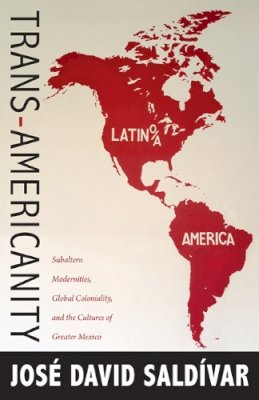
Stock image for illustration purposes only - book cover, edition or condition may vary.
Trans-Americanity: Subaltern Modernities, Global Coloniality, and the Cultures of Greater Mexico (New Americanists)
Jose David Saldivar
€ 42.31
FREE Delivery in Ireland
Description for Trans-Americanity: Subaltern Modernities, Global Coloniality, and the Cultures of Greater Mexico (New Americanists)
paperback. Saldivar is one of the founders of border studies and one of the most respected senior scholars in American Studies. In this work he introduces the term trans-Americanity as a frame for thinking more hemispherically within a global, world-systems frame. Series: New Americanists. Num Pages: 304 pages, 9 illustrations. BIC Classification: 1KBB; HBJK; JFSL4. Category: (P) Professional & Vocational. Dimension: 5969 x 3887 x 20. Weight in Grams: 408.
A founder of U.S.-Mexico border studies, José David Saldívar is a leading figure in efforts to expand the scope of American studies. In Trans-Americanity, he advances that critical project by arguing for a transnational, antinational, and "outernational" paradigm for American studies. Saldívar urges Americanists to adopt a world-system scale of analysis. "Americanity as a Concept," an essay by the Peruvian sociologist Aníbal Quijano and Immanuel Wallerstein, the architect of world-systems analysis, serves as a theoretical touchstone for Trans-Americanity. In conversation not only with Quijano and Wallerstein, but also with the theorists Gloria Anzaldúa, John Beverley, Ranajit Guha, Walter D. Mignolo, and Gayatri Chakravorty Spivak, Saldívar explores questions of the subaltern and the coloniality of power, emphasizing their location within postcolonial studies. Analyzing the work of José Martí, Sandra Cisneros, Toni Morrison, Arundhati Roy, and many other writers, he addresses concerns such as the "unspeakable" in subalternized African American, U.S. Latino and Latina, Cuban, and South Asian literature; the rhetorical form of postcolonial narratives; and constructions of subalternized identities. In Trans-Americanity, Saldívar demonstrates and makes the case for Americanist critique based on a globalized study of the Américas.
Product Details
Format
Paperback
Publication date
2011
Publisher
Duke University Press United States
Number of pages
304
Condition
New
Series
New Americanists
Number of Pages
304
Place of Publication
North Carolina, United States
ISBN
9780822350835
SKU
V9780822350835
Shipping Time
Usually ships in 15 to 20 working days
Ref
99-50
About Jose David Saldivar
José David Saldívar is Professor of Comparative Literature and Chair and Director of the Undergraduate Program in Comparative Studies in Race and Ethnicity at Stanford University. His books include Border Matters: Remapping American Cultural Studies, as well as The Dialectics of Our America: Genealogy, Cultural Critique, and Literary History and Criticism in the Borderlands: Studies in Chicano Literature, Culture, and Ideology (co-edited with Héctor Calderón), both also published by Duke University Press.
Reviews for Trans-Americanity: Subaltern Modernities, Global Coloniality, and the Cultures of Greater Mexico (New Americanists)
"Trans-Americanity is a magnificent, visionary book. I cannot think of another scholar working today who has helped to instantiate new fields and new lines of inquiry in the manner of José David Saldívar. He is an unusually generous and curious scholar, one who is perfectly willing to rethink earlier assumptions, appreciate the insights of his critics, and read broadly across disciplines. These strengths contribute to what I believe will be an extremely influential text, one that will be widely taught and carefully reviewed."—Mary Pat Brady, author of Extinct Lands, Temporal Geographies: Chicana Literature and the Urgency of Space "Intent on discerning the common concerns of subaltern studies, global coloniality, and transmodernity, José David Saldívar examines persistent motifs and literary themes in the imaginative literature of Greater Mexico and South Asia. Individually and collectively, the minoritized writings that he discusses articulate new epistemological grounds for critiquing a transmodern world governed by global capitalism and new forms of coloniality. Saldívar advocates an 'Americanity' that opens up the idea of America to contexts well beyond the United States, Latin America, and the Western Hemisphere."—Donald E. Pease, author of The New American Exceptionalism “Saldívar is one of the boldest and most important scholars in American Studies today. Like few others, he engages what Martí calls Nuestra América, and for that he should be congratulated. Trans-Americanity is well worth reading.”
Paul B. Wickelson
Rocky Mountain Review
“Saldıvar is one of the more interesting contemporary scholars in the field of American Studies. . .. [A]n excitingly inventive book that is sure to generate new avenues of scholarly inquiry.”
Seth Horton
Journal of American Culture
“Trans-Americanity is extraordinarily ambitious in its scope. . . . By providing conceptual linkages between authors and texts that are rarely read or taught together, Saldívar provides a critical map for scholars seeking to transnationalize American and US Latina/o studies.”
Julie Minich
Journal of American Studies
“Trans-Americanity’s seven chapters, useful preface, and experimental ending offer broad intellectual coverage of Latin America, South Asia, and the Americas from the nineteenth to the twenty-first centuries.”
Karen Mary Davalos
American Quarterly
Paul B. Wickelson
Rocky Mountain Review
“Saldıvar is one of the more interesting contemporary scholars in the field of American Studies. . .. [A]n excitingly inventive book that is sure to generate new avenues of scholarly inquiry.”
Seth Horton
Journal of American Culture
“Trans-Americanity is extraordinarily ambitious in its scope. . . . By providing conceptual linkages between authors and texts that are rarely read or taught together, Saldívar provides a critical map for scholars seeking to transnationalize American and US Latina/o studies.”
Julie Minich
Journal of American Studies
“Trans-Americanity’s seven chapters, useful preface, and experimental ending offer broad intellectual coverage of Latin America, South Asia, and the Americas from the nineteenth to the twenty-first centuries.”
Karen Mary Davalos
American Quarterly
